- Home
- Anne Mather
Follow Thy Desire Page 11
Follow Thy Desire Read online
Page 11
They had left the Oneba house soon after ten with Andrea occupying the front seat of the station wagon beside her father, and Helen uncomfortably ensconced in the rear with the suitcases. Not that the luggage was responsible for her discomfort. But the station wagon was not air-conditioned, and although the windows were open for most of the time, it was still enervatingly hot. She wondered how Morgan could drive in such conditions, particularly after his earlier indisposition, but apparently the medication he had taken had successfully discharged his headache and she wondered what it was to be so efficient. She had not known there was any successful cure for migraine, but perhaps as a doctor, Morgan experimented upon himself.
Since getting into the car, Andrea had become more animated than Helen had previously seen her, even smiling at her father now and then, and speaking to him in low tones of what she had been doing while he was away. That her conversation did not include the girl in the rear of the vehicle meant less than the relief Helen was feeling at knowing that Morgan’s daughter could behave much like any other girl of her age and was not entirely uncommunicative.
The sun was directly overhead when they left the plain and began the rocky climb into the hills, Away from the heat and the choking dust, the air became infinitely fresher, and the windows could be lowered without suffering the irritating flies that invaded the vehicle and attacked every inch of exposed flesh. It was possible to breathe without tasting grit between one’s teeth and without smelling the pervasive odour of the burnt landscape.
As the vegetation became thicker, so too did the villages. The station wagon passed through several settlements where some effort had been made to cultivate the soil, and although the living accommodations were primitive, the people looked reasonably healthy. However, the baneful influences of Helen’s society, those, of obesity combined with a lack of exercise, were not in evidence here, so perhaps they had problems of another kind. Certainly the sanitation left a lot to be desired, and Helen flinched from the sight of a grubby finger thrust playfully into a baby’s mouth.
Perhaps taking pity on her, Morgan glanced round once and said: ‘Not much further now. Only a matter of some eight miles. We should reach Nrubi by one o’clock.’
‘One o’clock.’ Helen digested this thankfully. ‘Good.’
‘I suppose you imagined the journey would take much less time,’ he remarked, his eyes meeting hers through the reflection in the rear-view mirror, but Helen refused to appear completely ignorant.
‘I guessed the roads would make the distance seem longer,’ she countered. ‘I didn’t expect a three-lane motorway, if that’s what you’re implying.’
‘Then you weren’t disappointed,’ he responded politely, and she realised with impatience that her words had sounded perter than she had intended.
Nrubi was in fact more than a village. Helen supposed one would describe it as a small town, although there were none of the facilities one might expect to find in a town of a similar size in England. But compared to the villages they had passed through, it was a veritable metropolis, with shops and stores and taverns, and houses of a much more habitable size. Its appearance was Moorish, Helen decided, with lots of white-painted buildings that repelled the glare of the sun. There were even several burnous-clad individuals lounging about in doorways, reminiscent of the tribesmen from the north, and what one could see of their dark faces revealed the aristocratic arrogance of the desert. The sun had bleached the pavements white, too, and the glare after the gentler colours of the countryside was blinding.
Morgan drove through the town, raising his hand now and then in acknowledgement of the greetings addressed to the station wagon. Obviously, everyone knew who he was, and even Andrea responded to their almost royal progression. Of course, thought Helen wryly, this was all the girl had known, this and Charlottesville, and the opulent surroundings of the Oneba household. She was wondering where Morgan’s house could be, and whether Andrea would react differently to her now that she was back in her own domain, and while the outline of Nrubi was imprinted on her brain, her thoughts were far from its narrow steets.
There were few cars about. Most of the people they saw were cycling, or on foot, and occasionally they glimpsed a black figure mounted on a mule; but such vehicles as there were were old and dented, and in obvious need of repair. Yet there was an air of inconsequence about their very indifference which was curiously appealing to someone used to the unspoken rigours of a so-called civilised existence, and Helen felt her spirits lifting as she stared wide-eyed through the open windows.
Morgan’s house stood on the outskirts of the town. There seemed an absence of any kind of fencing dividing one plot from another, but the house itself was built on three sides of a central courtyard which provided all the privacy she desired. Like the rest of the buildings she had seen, it was made of a kind of stucco, painted white, and sprawled without regard for the limitations of design. Several extensions appeared to have been added to the original building, and later she was to learn that this was where Morgan had his surgery and consulting rooms.
Morgan parked the station wagon in the shade of an umbrella-like acacia, and then thrust open his door and got out, stretching with evident relief. But no sooner had he done so than a boy came running from the house to greet him and behind the boy, in the shadowy porch of the building, a young African woman carrying a child hovered uncertainly.
‘Oh, stuff!’ exclaimed Andrea irritably, before climbing out herself, and Helen wondered at the event which had evoked such an unexpected response.
Realising no one was about to play doorman, she opened the rear door and was thrusting out her legs when the boy reached Morgan. She could see now that he was older than she had at first imagined, perhaps eighteen or nineteen, but there was no mistaking his obvious pleasure at their arrival.
‘Massa sir,’ he exclaimed eagerly, shaking Morgan’s unresisting hand. ‘Welcome home, Massa sir. Kori most concerned when Massa late in returning.’
‘Hello, Kori,’ responded Morgan amiably. ‘Nice to know I’ve been missed by someone. Who’s that you’ve got with you? Another of your relatives?’
Kori glanced round off-handedly at the woman with the baby, then turned back, shaking his head with apparent impatience. ‘Her name is Mfani, Massa sir. Pay no attention to her. She can wait. Tell me about your trip. You have a good wedding?’
As he spoke the boy’s eyes moved first to Andrea, then to Helen, widening as they took in her slender, curving figure, and silken fall of hair. Aware of his inquisitive interest, Helen doubted he was listening for Morgan’s reply, but Andrea distracted him by saying coolly:
‘There was no wedding, Kori. It was a wasted journey!’ before stalking off into the house.
The silence that followed this statement was discomfiting. Helen exchanged a glance with Morgan, but his expression was enigmatic and she sensed his anger was directed more towards herself than towards his daughter. Luckily, Kori recovered quickly, and switching his attention back to the man said:
‘You hungry, Massa sir? You like Kori make some steaks and salad?’
‘The woman, Kori,’ Morgan reminded him wearily. ‘What is she doing here? Has she been waiting for me? How long?’
Kori cast a reluctant stare over his shoulder. ‘You don’t have to worry about Mfani, Massa sir. She Bosumi’s woman. She can wait—’
‘Kori!’
The boy heaved an exaggerated sigh. Then he shrugged his black shoulders, bare but for the straps of the white vest he wore over knee-length shorts. ‘Two—mebbe three days,’ he conceded at last. ‘I told her I didn’t know when you’d be back, but she wouldn’t go.’
‘And you didn’t make any attempt to dislodge her, I suppose,’ remarked Morgan, his face so grim that Helen wondered what was making him so angry. ‘You let her stay. And I’d hazard took full advantage of your inflated status!’
Kori was looking increasingly anxious. ‘What could I do?’ he protested defensively. ‘The baby’s sick.
I couldn’t send her away.’
‘So sick she can wait while you ask about the wedding,’ pointed out Morgan shortly. ‘Oh, get out of my way. Send the woman to the surgery. I’ll see her there in five minutes. As soon as I’ve had time to wash my hands.’
‘Yes, sir, Massa sir.’
Kori made what looked suspiciously like a salute and would have moved away when Morgan added: ‘By the way, this is Miss Raynor. She’s going to be staying with us for a while. See that the bed is made up in the spare room, and the cases brought in, and you can make us all some steak and salad when you’ve installed the woman in the surgery.’
‘Yes, sir.’ Kori switched his attention to Helen again. ‘Pleased to make your acquaintance, Miss Raynor,’ he said, with the broad smile he had earlier bestowed upon his master. ‘I hope you’ll be happy here at Hawk’s Drift.’
Hawk’s Drift. Helen had not heard the words before, and she looked at Morgan for explanation. But he had merely nodded curtly to the woman who had emerged from the porch to stare admiringly at him, and was presently entering the shadowy interior of the house.
‘Pleased to meet you, Kori,’ said Helen in a rush, cringing at the hackneyed words of greeting, and then hastened after Morgan before he disappeared from sight. The African woman stared after her, too, and the baby, a puny-looking little thing, began to cry. But some unintelligible words from Kori attracted her attention, and Helen heard the shrill interchange that ensued as she followed Morgan into the house.
Her first impression was one of quietness and space. The airy entrance hall was wide and light, the walls painted a soft beige and hung with carvings and icons, and other examples of religious significance. Across the hall, open doors invited inspection of a cloistered verandah that circled the central courtyard of the house and to left and right ran shadowy passageways leading to the other apartments. It was all on one level, but the walls were enormously thick which accounted for the lack of noise, and the coolness. Beyond the courtyard she could see tangled vegetation, and through it the tantalising glimpse of water.
Morgan had halted in the hall and was waiting for her, his mouth drawn down at the corners. ‘I’m sorry everything seems to be so disorganised,’ he said tersely. ‘I suggest you wait in the living room or on the verandah until Kori shows you to your room, and we’ll eat as soon as I’ve dealt with the child.’
Helen moved her shoulders awkwardly. ‘Oh—please, don’t worry about me—’
‘I’m not worried about you. I’m simply trying to be polite. Believe me, it’s quite a strain at the moment.’
Helen straightened her back. ‘Why? Because of what Andrea said?’
‘Andrea?’ He shook his head. ‘I can deal with Andrea. Right now I have other things on my mind—not least what that damn-fool Kori has been doing with Bosumi’s woman.’
‘What he’s been do—’ Helen broke off, shaking her head. ‘I’m afraid I don’t understand.’
Morgan raked back his hair with a tired hand. ‘You will. If Bosumi comes here looking for her!’
‘You mean…’
‘That’s right.’
‘But she’s Bosumi’s woman. Kori—said so.’
‘I wouldn’t trust that boy as far as I could throw him, and the last thing I need right now is a vendetta opening up on my doorstep.’ He sighed, his gaze flickering over her broodingly. ‘Go and find yourself a seat on the verandah. I have to see my patient.’
He strode away, and although Helen watched him, he didn’t look back. On impulse, she didn’t go immediately on to the verandah, but wandered instead in the opposite direction to that which Morgan had taken, and presently found herself on the threshold of a moderately streamlined kitchen. There were wall-cupboards and sink units, and a scrubbed wooden table, and perched on a stool by the sink, staring out over the luxuriant vegetation that grew almost to the windows of the house, was Andrea Fox.
If Helen had set herself the task of looking for the girl, she would in all probability never have found her, but there, unlooked-for, she was, and Helen decided it was time they had a real conversation.
Unfortunately, Andrea didn’t seem to see it that way. As soon as she saw the other girl hovering in the doorway, she slid off the stool and would have walked straight past her if Helen’s hand on her arm had not prevented her. For a moment they stared at one another, their eyes almost on a level, but then Andrea’s lids dropped, revealing her veneer of maturity.
‘I’d like to talk to you,’ Helen said then quietly, but without releasing her arm. She was afraid if she did so Andrea would disappear again, and that kind of humiliation she could do without. ‘I’d like to explain why I didn’t marry your uncle.’
Andrea pushed her lips forward mutinously, but she didn’t say anything. Helen could find it in her heart to feel sorry for her. Obviously she would like to say so much, but she simply didn’t have the courage.
Now Helen chose her words carefully: ‘When—when two people plan to marry they have to be absolutely certain that it’s what they want—what they both want. It’s no good getting married and then finding out afterwards they’ve made a terrible mistake.’
Too late, she realised that that was exactly what Andrea’s parents had done, and the sudden shock of remembrance drew all strength from her fingers. Sensing the unexpected withdrawal, Andrea wrenched her arm away, and ran away along the corridor while Helen was still trying to gather her scattered composure. But as self-possession returned, anger was uppermost in her mind, anger with herself for her carelessness, and anger with Morgan and his wife for allowing their incompatibility to destroy their daughter’s confidence.
Kori came to find her on the verandah some time later. He had supplied her with a jug of iced lime juice, for which she was very grateful, and she had been watching the antics of a weaver bird in the dipping branches of a gnarled old tree that grew within the shaded environs of the courtyard. She was speculating about the stretch of water, whose reed-bounded shores stretched invitingly beyond the bushy vegetation that surrounded the villa, when he announced that her room was prepared.
‘You would like to wash before lunch?’ he enquired, with his ingratiating smile, but remembering what Morgan had said, Helen responded with only polite acquiescence.
To her surprise, Kori invited her to follow him along the verandah, and they entered the room which was to be hers from the courtyard. It was a decent-sized room, with a huge fan moving slowly at ceiling level. The walls were pastel-washed, but otherwise plain, and the bedspread was of some woven native design, fringed to touch the tiles of the floor. An old-fashioned wardrobe and dressing table, a cedarwood ottoman, and a circular rug beside the divan completed the furnishings, but it was obviously clean and pleasantly attractive.
‘Thank you, Kori,’ Helen said, standing in the middle of the room and looking round. ‘This is very nice.’
Her suitcases had been placed side by side on the ottoman, and now Kori moved to run his fingers over the leather. ‘You would like Kori to unpack your clothes?’ he suggested insinuatively, but remembering the scraps of lingerie that represented her underwear, she hastily declined.
‘I’ll do it later,’ she demurred. ‘It will give me something to do.’ She smiled to take the sharpness from the refusal. ‘Er—where’s the bathroom?’
Kori’s dark face which had been registering disappointment brightened. ‘I show you,’ he declared, and she followed him out of the doors which led into the corridor of the house, and along again in the direction of the kitchen.
The bathroom was almost opposite the kitchen, which Helen herself noted for future reference. There apparently only was the one bathroom, and she guessed Kori, from his position in the kitchen, would note all comings and goings. No flitting around in her nightdress or underwear, she thought dryly, relieved to remember she had brought a dressing gown with her. Still, the bathroom was reasonably efficient, with hot and cold running water, which Kori took much pleasure in pointing out. That the bath had clawe
d feet meant less when compared to the ancient clankings of the boiler, and the heat emanating from that direction gave the room the atmosphere of a sauna bath.
There was an appetising smell coming from the kitchen, and leaving Helen to wash her face and hands, Kori excused himself to attend to the meal. When Helen emerged again, she could see steaks sizzling under the grill and Kori was doing his best to toss some salad in a wooden bowl. She was tempted to offer advice, but decided against it, and walked instead into the small dining room adjoining where someone had laid the circular table for three.
Sighing, Helen wondered if Andrea would join them for lunch, and then thrust that particular problem aside. There was time enough to make friends with Andrea. Right now, she needed time to think, to adjust to these new surroundings, and to get her feelings for Morgan under control.
She was sitting at the table, staring unseeingly at a print of the Drakensberg peaks when she heard the sound of raised voices coming from the kitchen. She couldn’t understand what they were saying, but the tone was unmistakable, and recognising Morgan’s voice above Kori’s indignant squeal, she guessed he was getting the raw edge of his employer’s tongue.

 A Forbidden Temptation
A Forbidden Temptation Dark Castle
Dark Castle Hell Or High Water
Hell Or High Water Jake Howard's Wife
Jake Howard's Wife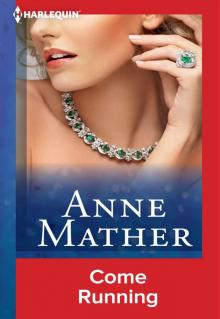 Come Running
Come Running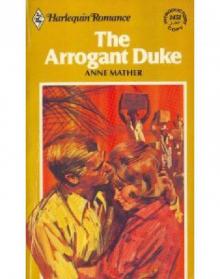 The Arrogant Duke
The Arrogant Duke Sweet Revenge
Sweet Revenge Passionate Protectors?
Passionate Protectors? Savage Awakening
Savage Awakening Come the Vintage
Come the Vintage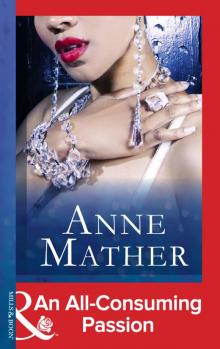 An All-Consuming Passion
An All-Consuming Passion A Fever In The Blood
A Fever In The Blood The Shrouded Web
The Shrouded Web A Haunting Compulsion
A Haunting Compulsion Duelling Fire
Duelling Fire Edge of Temptation
Edge of Temptation Wild Enchantress
Wild Enchantress The Brazilian Millionaire's Love-Child
The Brazilian Millionaire's Love-Child Captive Destiny
Captive Destiny The Pregnancy Affair
The Pregnancy Affair The Sanchez Tradition
The Sanchez Tradition A Passionate Affair
A Passionate Affair Sinful Truths
Sinful Truths Stay Through the Night
Stay Through the Night Seen by Candlelight
Seen by Candlelight No Gentle Possession
No Gentle Possession His Forbidden Passion
His Forbidden Passion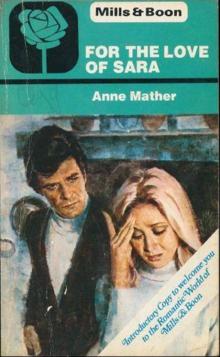 For the Love of Sara
For the Love of Sara A Trial Marriage
A Trial Marriage Melting Fire
Melting Fire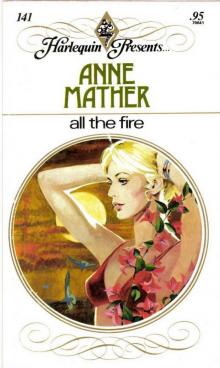 All The Fire
All The Fire Bedded For the Italian's Pleasure
Bedded For the Italian's Pleasure All Night Long
All Night Long The Japanese Screen
The Japanese Screen Rich as Sin
Rich as Sin Smokescreen
Smokescreen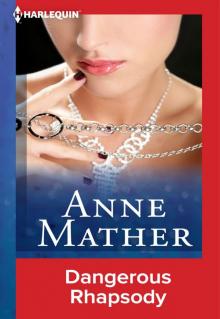 Dangerous Rhapsody
Dangerous Rhapsody Brittle Bondage
Brittle Bondage A Savage Beauty
A Savage Beauty Castles of Sand
Castles of Sand A Distant Sound of Thunder
A Distant Sound of Thunder THE VIRGIN'S SEDUCTION
THE VIRGIN'S SEDUCTION White Rose of Winter
White Rose of Winter Proud Harvest
Proud Harvest The Legend of Lexandros
The Legend of Lexandros Country of the Falcon
Country of the Falcon Diamond Fire
Diamond Fire Stormspell
Stormspell Legacy of the Past
Legacy of the Past Such Sweet Poison/Blind Passion
Such Sweet Poison/Blind Passion The Baby Gambit
The Baby Gambit The Smouldering Flame
The Smouldering Flame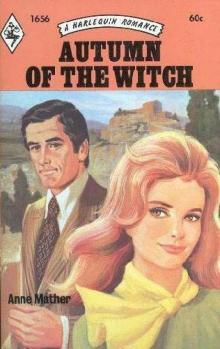 Autumn of the Witch
Autumn of the Witch Rachel Trevellyan
Rachel Trevellyan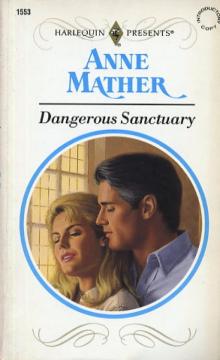 Dangerous Sanctuary
Dangerous Sanctuary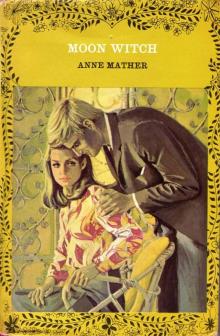 Moon Witch
Moon Witch An Heir Made in the Marriage Bed
An Heir Made in the Marriage Bed Images Of Love
Images Of Love Innocent Obsession
Innocent Obsession Tidewater Seduction
Tidewater Seduction Pacific Heat
Pacific Heat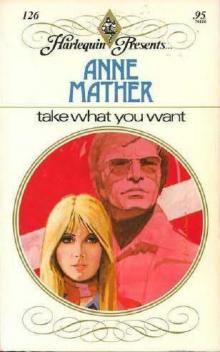 Take What You Want
Take What You Want The Spaniard's Seduction
The Spaniard's Seduction The High Valley
The High Valley A Woman of Passion
A Woman of Passion The Reluctant Governess
The Reluctant Governess Charade in Winter
Charade in Winter Mendez’s Mistress
Mendez’s Mistress Dark Moonless Night
Dark Moonless Night The Greek Tycoon's Pregnant Wife
The Greek Tycoon's Pregnant Wife The Autumn of the Witch
The Autumn of the Witch Night Heat
Night Heat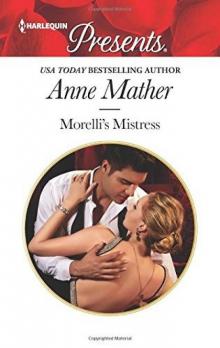 Morelli's Mistress (Harlequin Presents)
Morelli's Mistress (Harlequin Presents) Jack Riordan's Baby
Jack Riordan's Baby Beware the Beast
Beware the Beast Born Out of Love
Born Out of Love Greek Affairs in his Bed: Sleeping with a StrangerBlackmailed into the Greek Tycoon’s BedBedded by the Greek Billionaire
Greek Affairs in his Bed: Sleeping with a StrangerBlackmailed into the Greek Tycoon’s BedBedded by the Greek Billionaire Green Lightning
Green Lightning Guilty
Guilty Snowfire
Snowfire Moondrift
Moondrift Stolen Summer
Stolen Summer Such Sweet Poison
Such Sweet Poison Dark Venetian
Dark Venetian Innocent Sins
Innocent Sins Baby Out of the Blue
Baby Out of the Blue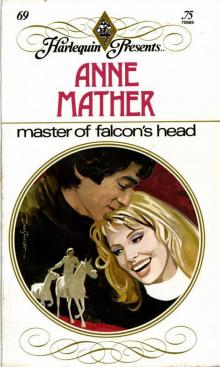 Master of Falcon's Head
Master of Falcon's Head Rooted in Dishonour
Rooted in Dishonour A Secret Rebellion
A Secret Rebellion The Forbidden Mistress
The Forbidden Mistress Dangerous Enchantment
Dangerous Enchantment The Judas Trap
The Judas Trap Burning Inheritance
Burning Inheritance Forbidden Flame
Forbidden Flame Who Rides the Tiger
Who Rides the Tiger Impetuous Masquerade
Impetuous Masquerade Fallen Angel
Fallen Angel Act of Possession
Act of Possession Dangerous Temptation
Dangerous Temptation Pale Dawn Dark Sunset
Pale Dawn Dark Sunset Dark Enemy
Dark Enemy Innocent Virgin, Wild Surrender
Innocent Virgin, Wild Surrender Follow Thy Desire
Follow Thy Desire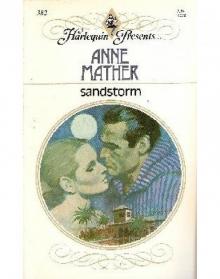 Sandstorm
Sandstorm Apollo's Seed
Apollo's Seed Whisper Of Darkness
Whisper Of Darkness A Wild Surrender
A Wild Surrender A Dangerous Taste of Passion
A Dangerous Taste of Passion The Night Of The Bulls
The Night Of The Bulls Hot Pursuit
Hot Pursuit The Longest Pleasure
The Longest Pleasure An Elusive Desire
An Elusive Desire Storm In A Rain Barrel
Storm In A Rain Barrel